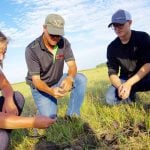Proposed bill | B.C.’s privacy commissioner criticized one section of the bill that could prevent disease information disclosures
Last month’s controversy over a proposed update to British Columbia’s Animal Health Act was overblown, say livestock officials.
B.C.’s Liberal government had tried in May to pass a bill that would have established a new process for disease outbreak detection and containment. However, a section of the act concerning privacy drew criticism from B.C.’s information and privacy commissioner and opposition MPs.
“A person must refuse, despite the Freedom of Information and Protection of Privacy Act, to disclose … information that would reveal that a notifiable or reportable disease is or may be present in a specific place or on or in a specific vehicle,” reads Section 16 of the act, which would also increase the maximum penalty from $2,000 to $75,000.
Read Also

Farmland ownership fires up Saskatchewan politicians
Saskatchewan politicians debate the enforcement of farmland ownership laws in the province.
The bill was one of four in the B.C. legislature not passed when the spring session ended at the end of May, although officials expect the bill to return in the future.
“Who knows what will happen in the fall or the spring sittings. We’re not sure, because we are in an election next year,” said Geraldine Auston, general manager of B.C. Pork.
“No one is really sure how quickly this will come back.”
NDP agriculture critic Lana Popham applauded the bill’s demise.
“British Columbians expect their government to follow our Freedom of Information law, and not to try and hide animal disease information from the public,” she wrote in a blog.
B.C. Cattlemen’s Association general manager Kevin Boon, whose organization was consulted before the bill’s appearance in the legislature, said the act isn’t designed to prevent the disclosure of information, but instead is intended to allow government and other officials to conduct an unimpeded investigation free from interference.
Previous false reports of anaplasmosis and brucellosis outbreaks have hurt producers and industry in the province, he said.
“We have to make sure that these allegations don’t get made without the proper investigation.”
The update also proposed new surveillance zones to monitor areas around a quarantine zone and increased disease control measures, which would require producers to keep records of an animal’s origin and movement and report any disease or unusual illness.
“What I gathered out of what was going on was more a political issue than it was actually the meat and bones of what the act said and what the act could do or couldn’t do,” said Boon.
“It was more to do with the process and the definitions of who the people were.”
Many of the proposed updates to the act, which was last updated in 1948, were intended to harmonize the legislation with that of other provinces and trading partners.
“If some neighbour phoned up the media and said, ‘I think there’s something going on on that farm,’ they’re permitted to do that and they’re not going to be sued for it,” said Auston.
“So public and media and everything, it’s still the same as it always was. They can report on something, it’s just that nobody would be able to confirm their story until something was actually confirmed on a farm.”
A new animal health framework is one of the goals outlined in the B.C. government’s agrifood strategy, which sets the goal of expanding business in that sector by almost $4 billion in the next five years by increasing domestic and international markets.














